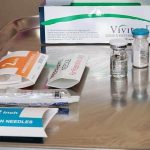Glenmark Pharmaceuticals Receives FDA Approval for Generic Prolixin

Glenmark Pharmaceuticals Ltd. has achieved a major milestone in the pharmaceutical industry with the receipt of final approval from the United States Food & Drug Administration (U.S. FDA) for their Fluphenazine Hydrochloride Tablets USP in four different strengths – 1 mg, 2.5 mg, 5 mg, and 10 mg. These tablets represent the generic version of Prolixin®1 Tablets, which come in the same strengths and are originally produced by Apothecon Inc. Glenmark Pharmaceuticals Inc., USA, will be responsible for the distribution of these Fluphenazine Hydrochloride Tablets in the United States.
This approval is a significant development for Glenmark, as it expands its product portfolio in the U.S. pharmaceutical market. The Prolixin® Tablets, in their various strengths, have exhibited robust performance, achieving annual sales of approximately $18.1 million, according to IQVIATM sales data for the 12-month period ending in September 2023. This approval provides an opportunity for Glenmark to enter and compete in this market segment and offer cost-effective alternatives to healthcare providers and patients.
Glenmark’s commitment to innovation and growth is evident through their current portfolio, which includes 189 products authorized for distribution in the U.S. market, along with 50 Abbreviated New Drug Applications (ANDAs) awaiting approval by the U.S. FDA. In addition to their internal product filings, Glenmark is actively exploring external development partnerships to enhance and expedite the expansion of their existing pipeline and portfolio.
About Glenmark Pharmaceuticals Limited: Glenmark Pharmaceuticals Limited, listed on both the Bombay Stock Exchange (BSE: 532296) and the National Stock Exchange (NSE: GLENMARK), is a global pharmaceutical company known for its research-led approach. The company operates across various segments, including Branded, Generics, and Over-the-Counter (OTC) products, with a particular focus on therapeutic areas such as respiratory, dermatology, and oncology.
Glenmark boasts a presence in over 80 countries and operates 10 state-of-the-art manufacturing facilities spanning four continents. Its commitment to research and development is underscored by its inclusion in the In Vivo/Scrip 100 list of the Top 100 Companies Ranked by R&D and Pharmaceutical Sales for the year 2021. Additionally, it has been recognized as one of the Top 50 Generics and Biosimilars Companies Ranked by Sales for the same year, as per Generics Bulletin/In Vivo. The company is also Great Place To Work® Certified™ in India, reflecting its commitment to providing a positive and nurturing work environment.
Furthermore, Glenmark is taking meaningful steps towards environmental sustainability. In 2023, its Green House Gas (GHG) emission reduction targets received approval from the Science Based Target initiative (SBTi), making Glenmark the second Indian pharmaceutical company to achieve this recognition. The company also demonstrates a strong commitment to corporate social responsibility (CSR) by impacting over 2.9 million lives through its CSR initiatives over the last decade.





